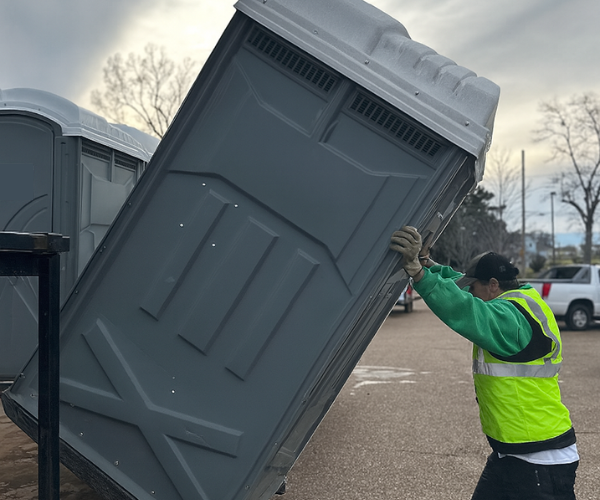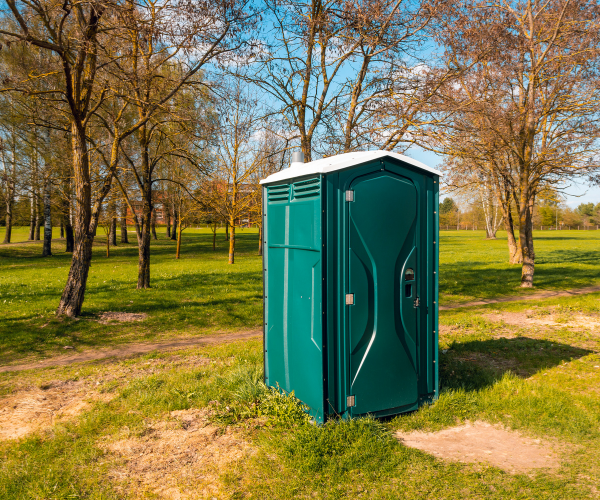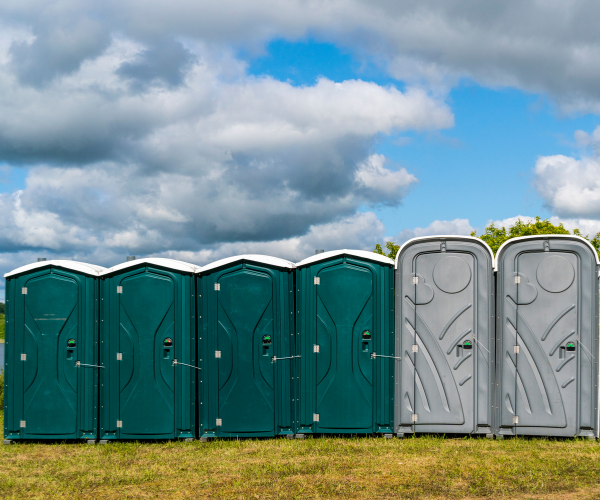Portable toilets present a myriad of eco-friendly advantages that make them a favorable choice for environmentally conscious events and construction sites. Firstly, they significantly reduce water waste compared to traditional toilets, utilizing only a fraction of the water necessary for flush systems. This is particularly impactful in conserving water resources, especially in areas prone to droughts or with limited water supply. Additionally, portable toilets eliminate the need for extensive plumbing infrastructures, which can be invasive to natural landscapes and habitats.Moreover, the waste management systems within portable toilets are designed to facilitate efficient and safe waste treatment processes. These systems often involve the use of biodegradable chemicals to treat waste, breaking it down into less harmful substances, which then can be more easily processed by sewage facilities.A key component of their eco-friendliness is the containment of waste in self-enclosed tanks, reducing the risk of leakage or contamination in the surrounding environment. Such secure containment prevents exposure to harmful pathogens and maintains soil and water quality around the event site or construction area.Innovations in portable toilet design also contribute to their sustainability by incorporating recycled materials and enhancing their energy efficiency. Advances such as solar-powered ventilation can improve air quality within the units without relying on electricity from non-renewable sources.Furthermore, many providers of portable toilet services offer environmentally responsible disposal options for waste. These can include partnerships with certified treatment facilities that prioritize minimal environmental impact, ensuring that waste is processed in an environmentally sound manner. By selecting eco-friendly portable toilets, event organizers not only comply with environmental regulations but also align themselves with public expectations for sustainable practices. Ultimately, portable toilets present a pragmatic, sustainable option that supports environmental conservation while fulfilling essential sanitation needs.

Portable Toilet Rentals in Bartow County, Tennessee
Call today for a free quote (423) 719-5081
Portable Toilet
Fast, Easy, & 100% Free To Get Started
Over 20 Years of Excellence
For more than 20 years, our company has proudly served the Bartow County community, offering top-notch portable toilet solutions. We focus on upholding high standards and consistently ensuring customer satisfaction with every service we provide.
Unmatched Quality Service
Our commitment to quality service is unmatched, providing reliable and sanitized portable toilets tailored to your event needs. We ensure that our customers receive the best possible experience with every rental.
Swift, Reliable Deliveries
We pride ourselves on our ability to deliver portable toilets quickly and efficiently, ensuring that your event runs smoothly. Our reliable service guarantees that you receive the necessary equipment right when you need it.
Efficient Portable Toilet Solutions in Bartow County
Call for a Free Quote Today
(423) 719-5081
Located in the heart of Bartow County, our Portable Toilet company delivers dependable sanitation solutions with unmatched reliability. As a locally owned and operated business, we take pride in upholding the highest quality standards for our community. Whether you're managing a construction site, hosting a grand wedding, organizing a lively festival, or throwing an intimate party, our clean and convenient portable toilets are the ideal choice. We extend our services beyond Bartow County to surrounding areas, ensuring timely and professional delivery. Enjoy peace of mind with our hassle-free rentals and maintenance, tailored to the distinct needs of every event. Rely on us for your portable sanitation needs and experience outstanding customer satisfaction.


Standard Portable ToiletOur standard porta john rental units are durable and reliable for any commercial build site, housing development, public works project, or remodel job.Features include dome lighting, grated floors, and an “In-Use” locking mechanism for privacy and comfort.Regularly maintained, inspected, and cleaned by FusionSite at your location.

Wheelchair Accessible RestroomsDeveloped as an alternative to full ADA-compliant restrooms, the Liberty is a spacious, wheelchair-accessible unit that can also be promoted as a family-sized restroom.Includes a patented flat-floor system for easy wheelchair access and maneuverability.Handrails, paper holder, and rotary latch are designed for simple, intuitive end-user operation.

Portable SinkPortable hand washing stations are essential for keeping your work site sanitary and clean.Features hands-free foot pumps, liquid soap, and paper towels.Perfect for job sites without water hookups, these units can handle hundreds of washes between services.
We Proudly Serve
Standard Portable Toilets
Our Standard Portable Toilets in Tennessee provide clean and convenient sanitation solutions for diverse needs.
High Rise Portable Toilets
Serving Bartow County, our High Rise Portable Toilets offer efficient and accessible restroom solutions for elevated sites.
Restroom Trailers
At Bartow County, The Bolles Co's Restroom Trailers provide luxury and comfort for special events and gatherings.
Roll off Dumpsters
The Bolles Co provides reliable Roll off Dumpsters for efficient waste management in Bartow County.
Septic Tank Cleaning
Offering comprehensive Septic Tank Cleaning services at The Bolles Co, ensuring systems run smoothly across Tennessee.
Grease Trap Cleaning
Based in Bartow County, Tennessee, we provide extensive Grease Trap Cleaning services ensuring system efficiency and hygiene.
Fencing & Barricades
The Bolles Co provides secure Fencing & Barricades services across Tennessee for event and site safety.
Residential Storage
In Bartow County, our Residential Storage services offer secure and convenient space solutions for your needs.
Bartow County Portable Toilet and Event Services
Obtaining a quote and arranging delivery for a Portable Toilet has never been more convenient. Begin by filling out our simple online form, located both at the top and bottom of our webpage, or just click the 'Get A Quote' button available on multiple pages. The form is straightforward, requiring only your first name, last name, phone number, and email to get started. Once submitted, our team will review your request and provide a detailed quotation swiftly, ensuring you have all the information needed to make an informed decision. We prioritize a seamless process so that from initial inquiry to delivery, everything is managed efficiently and transparently. Our goal is to remove any hassle, allowing you to focus on planning a successful event. With our commitment to excellent customer service, booking a portable toilet with us is not only easy but also a rewarding experience.

Discover the local charm of Bartow County with our reliable Portable Toilet services that blend seamlessly into any setting, from outdoor attractions to community events. The lush landscapes and vibrant activities in this region make it a unique place to host gatherings, be it on the shores of the beautiful Lake Allatoona or during the exciting festivities of the annual Bartow County Fair. Our service enhances your guests' experiences by providing top-notch sanitation solutions. At our company, we pride ourselves on being a part of Bartow County's growth and development, bringing expert portable toilet rentals that cater to various needs. Whether you're planning a family reunion at Red Top Mountain State Park or facilitating an outdoor wedding, our portable toilets are designed to provide comfort and cleanliness. Our units are well-maintained and prepared to handle the demands of local events, leaving you to enjoy your time without worry. The ease of access, robust construction, and ample facilities we offer contribute significantly to our reputation as a leading provider in the community. Participate in Bartow County's green initiatives by choosing our eco-friendly portable restroom options, perfect for outdoor festivals and community gatherings. Highly praised in user feedback, our services prove that practicality and environmental responsibility can go hand in hand, delivering outstanding satisfaction at every event.
Positioned as the best choice for portable toilets in Bartow County, our company combines local expertise with unparalleled service quality. Serving this area with pride, we focus on providing personalized solutions that enhance any special occasion, from weddings to cultural celebrations. Our extensive range of well-maintained units guarantees hygiene and comfort for all your guests.Our dedicated team works closely with customers to understand their specific requirements, offering flexible delivery and setup options tailored to each event. Our reputation for dependability and customer satisfaction stands testament to our commitment to excellence, ensuring that every interaction feels like a partnership.By choosing us, you're not only opting for outstanding service but also supporting a community-focused business that values your event's success as much as you do. Our proactive approach to innovation in this field allows us to offer the most current solutions suitable for modern gatherings.
Our company is renowned for providing fast, reliable Portable Toilet services that seamlessly integrate into your event planning process. We understand the importance of timeliness and dependability, ensuring our units are delivered on schedule and in pristine condition.Our fleet is always ready to accommodate events of any size, adapting our services to suit construction sites, private functions, and public gatherings alike. With a focus on efficiency, our team ensures swift setups and takedowns, allowing you to focus on what truly matters—your event.By emphasizing customer satisfaction and flexibility, we provide not only portable toilets but also peace of mind, knowing that your sanitation needs are handled by the best in the business. Our dedication to excellence offers clients assurance that every detail is expertly managed.
Discover Portable Toilets in Bartow County
Renting a Portable Toilet in Bartow County couldn't be simpler. To begin the process, simply visit our website and locate the 'Get A Quote' button available throughout the site for easy access. Clicking this button will direct you to our user-friendly form, designed to capture essential details to facilitate a personalized quote. You'll need to fill out basic contact information, including your first name, last name, phone number, and email.Once the form is submitted, our responsive team will quickly process your request, ensuring that all your needs are understood and addressed. We strive to provide timely and accurate quotes, enabling you to make informed decisions about your event's sanitation requirements. In addition to the form submissions, feel free to reach out to us via phone or email for any inquiries or special requests.Our customer support team is always ready to guide you through the selection process, assisting in choosing the most suitable portable toilet units based on the size and nature of your event. Whether you need standard units, luxury restroom trailers, or ADA-compliant options, we have a diverse range to accommodate any occasion.Furthermore, for events requiring last-minute additions or changes, our flexible service model allows for quick adjustments, ensuring that our facilities arrive on time and in immaculate condition. This approachable and efficient rental process is designed to minimize your planning stress, allowing you to focus on the success of your event while we handle the sanitation logistics. By choosing our services, you partner with a team dedicated to delivering convenience and satisfaction every step of the way.
Understanding the delivery timeframe for portable toilet orders is a crucial element in successful event planning. At our company, we prioritize providing clear and reliable delivery timelines to ensure you have total peace of mind leading up to your event. Typically, orders are processed promptly, with delivery occurring within 24 to 48 hours of order confirmation, depending on the event's location and size.Our seasoned logistics team coordinates closely with customers to establish the most efficient delivery schedule, taking into account potential site constraints and specific setup requirements. For larger events or those requiring more extensive setups, we recommend placing orders with additional lead time to secure availability and ensure a seamless delivery process.Time-sensitive deliveries, while always prioritized, are handled with the utmost care to ensure that promptness does not compromise the quality or hygiene of the units. Additionally, our comprehensive tracking system allows customers to receive real-time updates on the delivery status of their orders, providing transparency and eliminating any uncertainties.Particularly during peak seasons or in instances involving high demand, our team is proficient in managing logistics to prevent any delays, thus maintaining our commitment to customer satisfaction. We are also adept at accommodating special requests or adjustments to delivery timing, demonstrating flexibility without sacrificing service quality.The reliability of delivery timeframes reflects our dedication not just to meeting but exceeding client expectations, setting us apart as a dependable partner in portable sanitation. Our goal is to make the logistics of sanitation simple and stress-free, assuring that every step, from initial contact to final delivery, is carried out with precision and care.
Absolutely, we pride ourselves on the ability to service a broad spectrum of events and construction services, ensuring your sanitation needs are met regardless of the occasion. Our diverse range of products includes luxury restroom trailers, porta potties, roll-off dumpsters, fencing, and barricades, among other options, catering to both intimate gatherings and large-scale festivals.From weddings to corporate events and family reunions, we offer seamless and professional sanitation solutions, enhancing guest experiences with clean, convenient facilities. Additionally, our services extend to sporting events, trade shows, and public gatherings, providing flexible and timely solutions tailored to diverse needs.Our construction service offerings are equally comprehensive, supporting projects of varying sizes with a focus on durability and efficiency. Our ADA-compliant units and portable sinks ensure accessibility and hygiene for all attendees or workers on-site, aligning with regulatory requirements and enhancing safety.We understand the varied demands of different events or worksites, which is why our team works closely with customers to understand specific requirements, customizing solutions that meet all logistical needs effectively. Whether it's a quick one-day setup or a long-term agreement for a construction project, our offerings adapt to provide maximum convenience and satisfaction.Our commitment to flexibility and quality positions us as a leading provider in the portable sanitation industry. Regardless of your event's complexity, our expertise ensures a smooth process from the first inquiry to the conclusion of your event, upholding the highest standards of service excellence.

